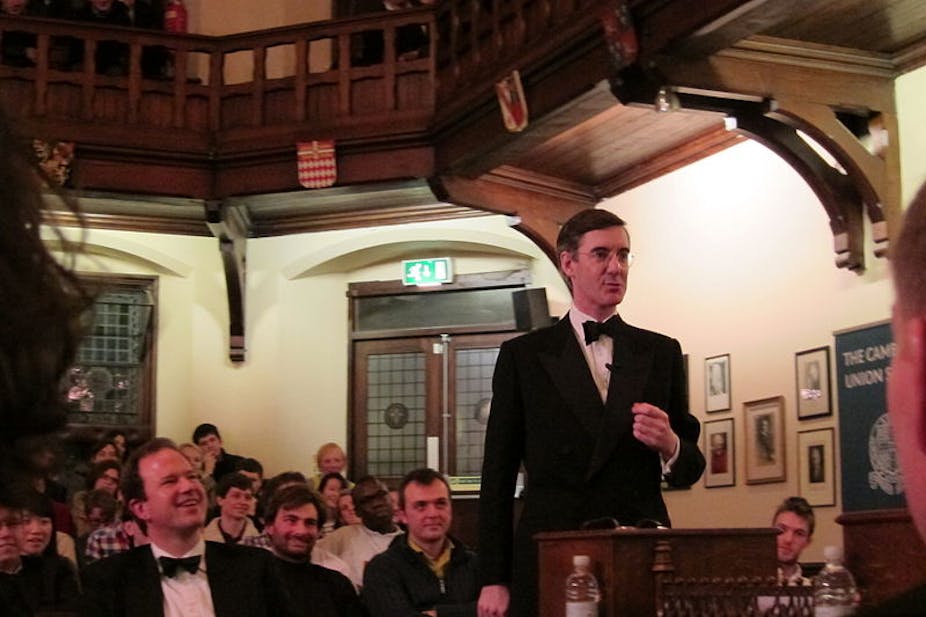Jacob Rees-Mogg, old-Etonian Conservative MP for North East Somerset, rightly feels “very silly”. Last week it was revealed on the BBC’s Newsnight program that Rees-Mogg had been the guest of honour at a meeting of the Traditional Britain Group (TBG).
The TBG have very strong opinions on a number of issues, and are not shy in voicing them. Their website calls for the repatriation of immigrants. It highlights Baroness Doreen Lawrence, mother of the murdered Stephen, as an example of someone who should go back to their “natural homeland”. By attending the dinner, therefore, Rees-Mogg has associated the Conservative Party with views that many now find intolerable.
The Conservative Party has long struggled to distance itself from racism. Gone are the days when a Conservative candidate can stand on a ticket of “if you want a nigger for a neighbour, vote Liberal or Labour”, as Peter Griffiths did at the 1964 General Election. But, as recent events over the issue of gay marriage has shown, David Cameron’s attempt to re-package the Conservative Party as socially liberal has its limits. Therefore, Rees-Mogg’s attendance at the TBG dinner also threatens to undermine his party leader.

Many readers will be aware of the struggle that exists within the Conservative Party between its progressive and traditionalist wings. However, most will probably not know the duration and extent of this struggle. I addressed these areas in a book, The Conservative Party and the extreme right 1945-1975. During the Second World War, The Conservative Party’s Central Office monitored “outside organisations”. Under the Maxwell Fyfe Reforms of 1948-49, a new department, the Voluntary Organisations Section, took over this task. Its terms of reference included gathering intelligence on right-wing groups that could cause problems for the Conservative Party.
Central Office did this because it realised that the Second World War had created a new paradigm. It was no longer possible to nonchalantly acknowledge the Conservative Party’s links with fascists and extreme right groups, as Stanley Baldwin had done before the war. Genocide had put paid to that. Yet, there were still many Conservatives with links to the extreme right after the war. Therefore, the Conservative Party and its bureaucracy gathered information on groups and individuals and took whatever action it thought necessary to avoid embarrassing connections.
For most of the time, this strategy worked. How much does the public know about the more than 300 extreme right-wing groups that have existed since the Second World War? The answer is: very little. This ignorance is partly a consequence of the actions of the Conservative Party. There might be some perception of links with the National Front in the 1970s, but very few know the lengths Central Office went to in order to stop this association becoming toxic. Even fewer will be aware of Central Office’s role in damaging the League of Empire Loyalists, the repository for erstwhile Mosleyites and putative neo-Nazis.
Bid for votes?
So why did Rees-Mogg attend the TBG dinner? He could have been unaware of the furore that would ensue. That would mean he is merely incompetent, which is not a crime for an MP. But, are we to believe this of an Oxford graduate, former president of the University Conservative Association, and son of William Rees-Mogg, late editor of The Times?
An MP has a duty to ascertain the information on any group before accepting an invitation to be their guest of honour. A failure to do so would leave their party open to the kind of problems that the Conservatives now face due to Rees-Mogg’s visit. It would also leave Rees-Mogg liable to accusations of negligence by party whips. But surely he did seek information on the TBG before attending - in which case, was the information he received faulty? This seems unlikely given Central Office’s mature information gathering machine.
Could it be, then, that Rees-Mogg’s visit serves another purpose? After all, by giving a nod and a wink to voters concerned about immigration and Europe, perhaps Rees-Mogg is attempting to attract votes from Ukip and BNP supporters.
Attracting your opponents’ voters by seeming to address their concerns is an old political tactic, but the Conservative Party is particularly adept at it when it comes to the extreme right. The Immigration Act (1962), Margaret Thatcher’s “swamping” comment in reference to immigrants (1978), William Hague’s “Last chance to save the pound” (2001), and David Cameron’s EU Referendum Bill (2013), are examples of the Conservative Party’s attempt to attract right-wing voters.
Do these tactics work? Check the most recent YouGov polls on the anti-immigration advertising campaign run by the Conservatives in London. The poll, released yesterday showed that support for the campaign (which Nigel Farage dismissed as “nasty”) has increased by 10% since July while the number of those who said they were opposed to the campaign declined by 8%.
The thing about dog whistles is that a lot of people seem to hear them.

